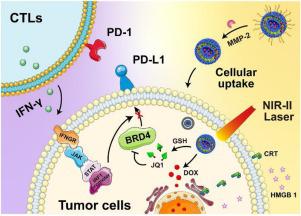当前位置:
X-MOL 学术
›
Nano Today
›
论文详情
Our official English website, www.x-mol.net, welcomes your
feedback! (Note: you will need to create a separate account there.)
Overcoming immune resistance by sequential prodrug nanovesicles for promoting chemoimmunotherapy of cancer
Nano Today ( IF 13.2 ) Pub Date : 2020-11-18 , DOI: 10.1016/j.nantod.2020.101025 Fengqi Zhou , Jing Gao , Zhiai Xu , Tianliang Li , Ang Gao , Fang Sun , Fengyang Wang , Weiqi Wang , Yong Geng , Fan Zhang , Zhi Ping Xu , Haijun Yu
Nano Today ( IF 13.2 ) Pub Date : 2020-11-18 , DOI: 10.1016/j.nantod.2020.101025 Fengqi Zhou , Jing Gao , Zhiai Xu , Tianliang Li , Ang Gao , Fang Sun , Fengyang Wang , Weiqi Wang , Yong Geng , Fan Zhang , Zhi Ping Xu , Haijun Yu

|
Chemotherapy by certain types of anticancer drugs (, doxorubicin (DOX) and oxaliplatin (OXA)) can elicit antitumor immune response by promoting immunogenic cell death (ICD) of the tumor cells. However, ICD-based chemoimmunotherapy is severely impaired by non-specific distribution of the chemotherapeutics and T lymphocyte-induced immune resistance. To address these challenges, we herein reported a sequential prodrug nanovesicle specifically designed for enhancing drug delivery to the tumor tissues and reducing the immunological resistance of the tumor cells. The prodrug nanovesicles were composed of fluorophore IR-1061, chemotherapeutic DOX, and a prodrug of bromodomain-containing protein 4 inhibitor (BRD4i) JQ1. Upon 1064 nm laser irradiation, IR-1061 induced mild hyperthermia for triggering NIR-Ⅱ fluorescence imaging-guided drug release at the tumor site. DOX promoted intratumoral infiltration of the cytotoxic T lymphocytes (CTLs) by inducing ICD of the tumor cells. Meanwhile, JQ1 blocked IFN-γ-induced upregulation of programmed death ligand 1 (PD-L1) to reduce the adaptive immune resistance. In combination with laser irradiation, the prodrug nanovesicles remarkably inhibited growth of both 4T1 breast and CT26 colorectal tumors, and suppressed lung metastasis of 4T1 breast tumor in the immunocompetent mouse model. The prodrug nanoplatform reported herein might provide a novel insight for promoting chemoimmunotherapy of cancers by overcoming PD-L1-dependent immune evasion through the IFN-γ-BRD4-PD-L1 axis.
中文翻译:

通过连续前药纳米囊泡克服免疫抵抗以促进癌症的化学免疫治疗
某些类型的抗癌药物(阿霉素(DOX)和奥沙利铂(OXA))的化疗可以通过促进肿瘤细胞的免疫原性细胞死亡(ICD)来引发抗肿瘤免疫反应。然而,基于 ICD 的化学免疫治疗因化疗药物的非特异性分布和 T 淋巴细胞诱导的免疫抵抗而受到严重损害。为了应对这些挑战,我们在此报道了一种连续前药纳米囊泡,专门设计用于增强药物向肿瘤组织的递送并降低肿瘤细胞的免疫抵抗力。前药纳米囊泡由荧光团 IR-1061、化疗药物 DOX 和含溴结构域蛋白 4 抑制剂 (BRD4i) JQ1 的前药组成。在 1064 nm 激光照射下,IR-1061 诱导轻度高温,从而触发 NIR-Ⅱ 荧光成像引导肿瘤部位的药物释放。 DOX 通过诱导肿瘤细胞的 ICD 促进细胞毒性 T 淋巴细胞 (CTL) 的瘤内浸润。同时,JQ1阻断IFN-γ诱导的程序性死亡配体1(PD-L1)的上调,从而降低适应性免疫抵抗。与激光照射相结合,前药纳米囊泡显着抑制了 4T1 乳腺肿瘤和 CT26 结直肠肿瘤的生长,并在免疫功能正常的小鼠模型中抑制了 4T1 乳腺肿瘤的肺转移。本文报道的前药纳米平台可能通过 IFN-γ-BRD4-PD-L1 轴克服 PD-L1 依赖性免疫逃避,为促进癌症化学免疫治疗提供新的见解。
更新日期:2020-11-18
中文翻译:

通过连续前药纳米囊泡克服免疫抵抗以促进癌症的化学免疫治疗
某些类型的抗癌药物(阿霉素(DOX)和奥沙利铂(OXA))的化疗可以通过促进肿瘤细胞的免疫原性细胞死亡(ICD)来引发抗肿瘤免疫反应。然而,基于 ICD 的化学免疫治疗因化疗药物的非特异性分布和 T 淋巴细胞诱导的免疫抵抗而受到严重损害。为了应对这些挑战,我们在此报道了一种连续前药纳米囊泡,专门设计用于增强药物向肿瘤组织的递送并降低肿瘤细胞的免疫抵抗力。前药纳米囊泡由荧光团 IR-1061、化疗药物 DOX 和含溴结构域蛋白 4 抑制剂 (BRD4i) JQ1 的前药组成。在 1064 nm 激光照射下,IR-1061 诱导轻度高温,从而触发 NIR-Ⅱ 荧光成像引导肿瘤部位的药物释放。 DOX 通过诱导肿瘤细胞的 ICD 促进细胞毒性 T 淋巴细胞 (CTL) 的瘤内浸润。同时,JQ1阻断IFN-γ诱导的程序性死亡配体1(PD-L1)的上调,从而降低适应性免疫抵抗。与激光照射相结合,前药纳米囊泡显着抑制了 4T1 乳腺肿瘤和 CT26 结直肠肿瘤的生长,并在免疫功能正常的小鼠模型中抑制了 4T1 乳腺肿瘤的肺转移。本文报道的前药纳米平台可能通过 IFN-γ-BRD4-PD-L1 轴克服 PD-L1 依赖性免疫逃避,为促进癌症化学免疫治疗提供新的见解。











































 京公网安备 11010802027423号
京公网安备 11010802027423号